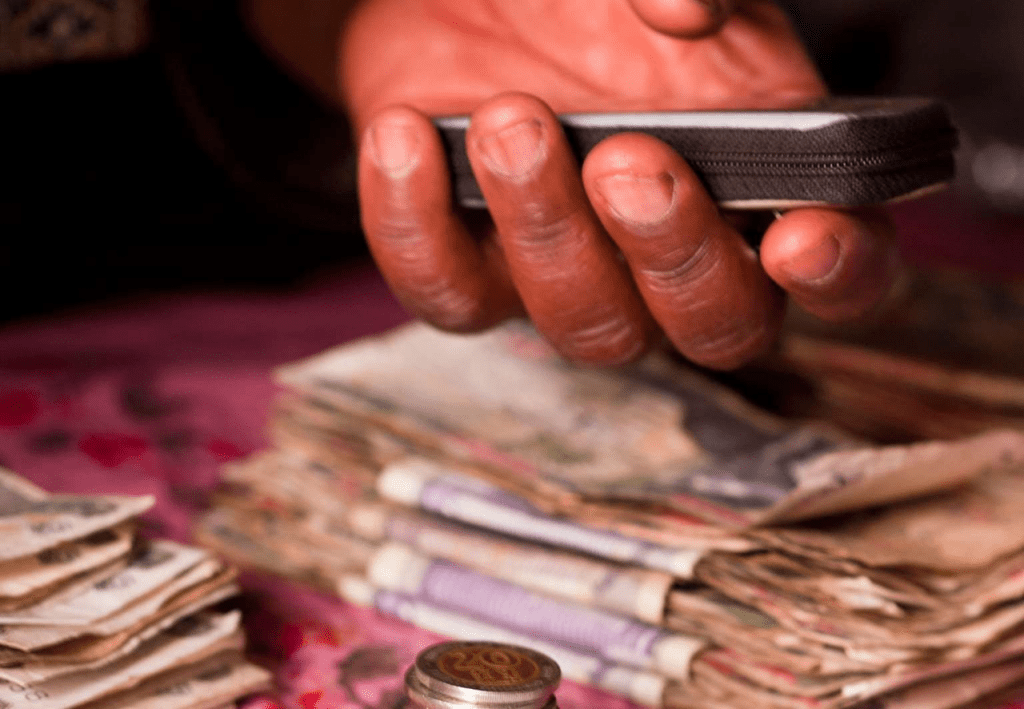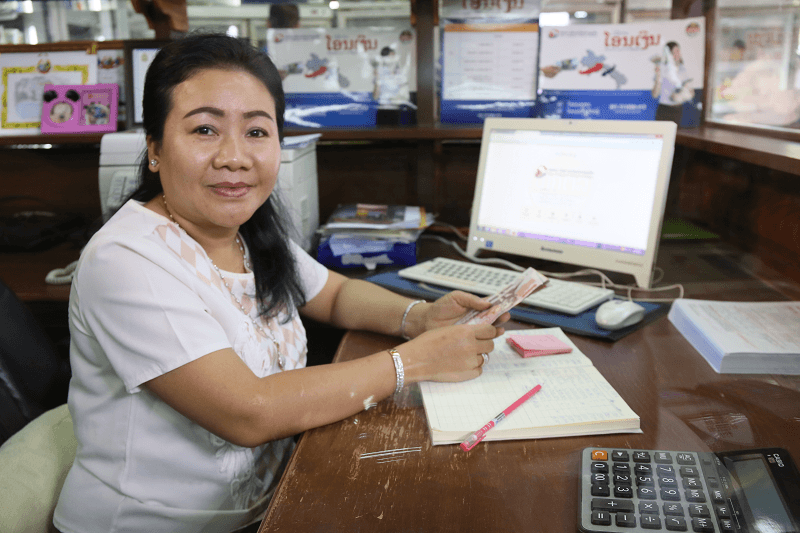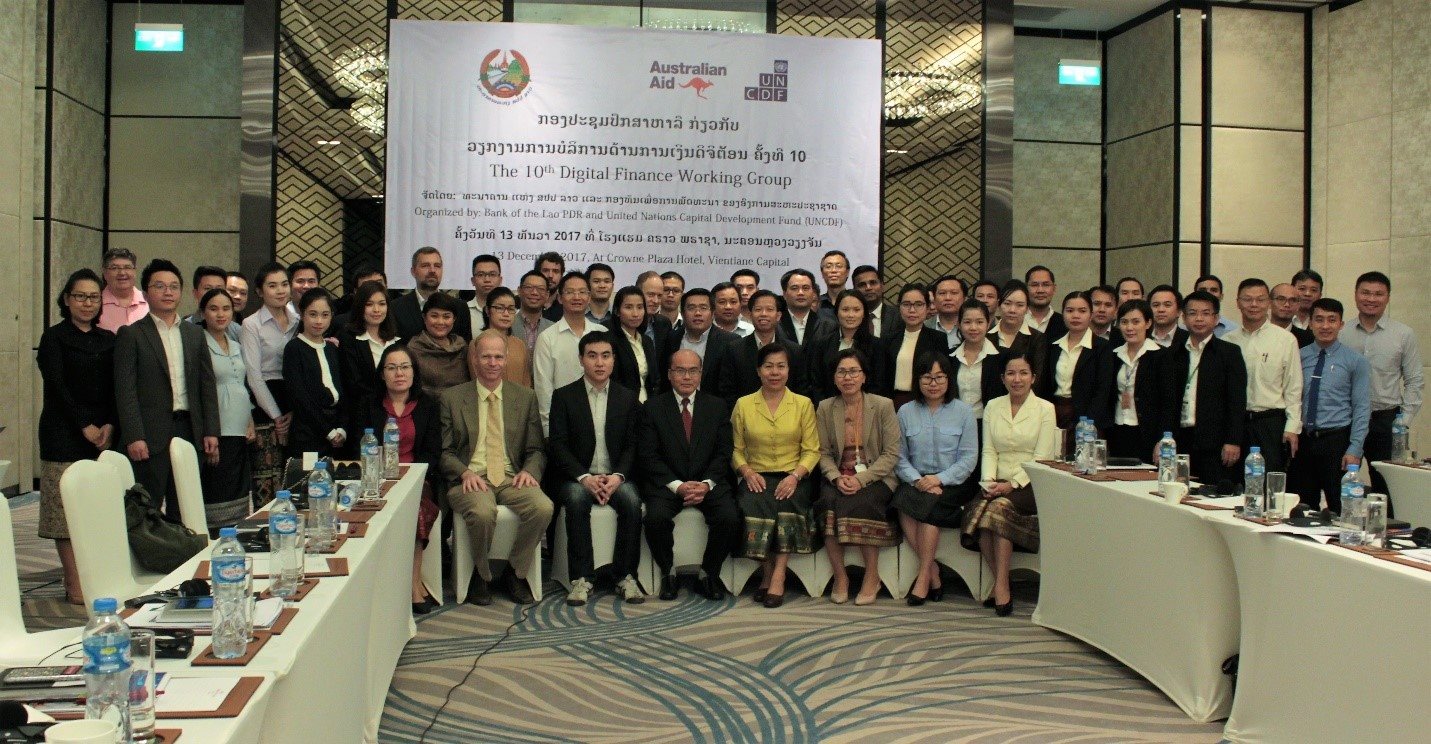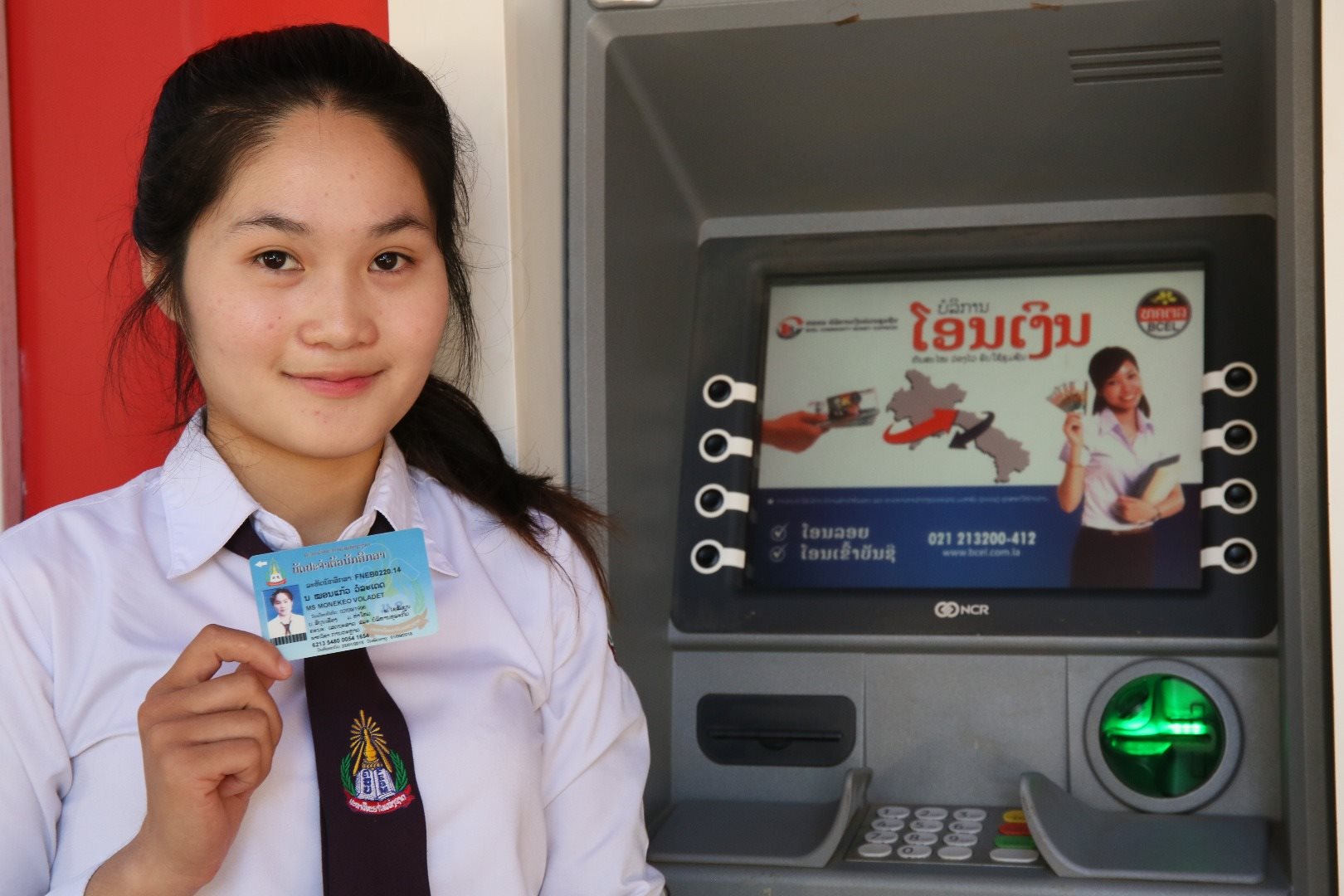
Agents-The Revolution on the Ground in Lao PDR
The mixed emotions of excitement and nervousness would be the best way to describe how new branchless banking agents feel in the Lao People’s Democratic Republic (Lao PDR).
Republished from the UNCDF MM4P website: https://www.uncdf.org/article/2507/agents-revolution-on-the-ground-lao-pdr
Vientiane, LAO PDR – The mixed emotions of excitement and nervousness would be the best way to describe how new branchless banking agents feel in the Lao People’s Democratic Republic (Lao PDR). For many prospective agents, who humbly regard themselves as rural, less-educated people, having the opportunity to work with the country’s largest bank is an unusual, unexpected opportunity.
In June 2015, one of the country’s leading banks—Banque pour le Commerce Extérieur Lao Public (BCEL)—launched a new concept in banking for the country: branchless banking through agents, a service the bank branded as BCEL Community Money Express (BCOME). The project was supported by United Nations Capital Development Fund (UNCDF), its national implementation programme Making Access to Finance More Inclusive for Poor People (MAFIPP) and PHB Development, from concept through pilot and on to commercial launch. Today, BCOME has more than doubled the size of the BCEL branch and service unit network, and with more than 125 agents, it is represented in every province of the country.
One of the most outstanding agents in the country, Nouteng Sybounheueang of Souvannaphoun Village in Paklai District, briefly shared her story:
First, I was worried [that] I did not make the decision right away when the staff of BCEL approached me about being an agent. I just replied to them that I needed time to think about it. And in my thoughts, I started to wonder how can one walk into my shop and offer me such a big job? Being a bank’s agent, how much money would I have to have? What kind of tasks would I be dealing with? I am only a low-educated rural woman, running a small shop selling miscellaneous goods, and I had never touched a computer or iPad.
After taking a night to think it over, Mrs. Sybounheueang called bank staff the next day to confirm her interest. She then spent two weeks preparing the agent documents, to apply and to be approved. After that, she transformed a storage room for her goods into her new office. She purchased a laptop and a printer as required by the bank, though as she completed primary school only, she did not know how to use them. However, the BCOME team arranged a one-day training at her place on how to use the computer, how to access the BCOME system and how to conduct transactions for her customers.
Mrs. Sybounheueang was among the first few BCOME agents registered in July 2015 when the project was still in its pilot phase. Since that time, BCEL has expanded the BCOME agent network across the country, with over 128 agents in every province and a target of 410 agents by the end of 2019. Yet, the quantity of agents is less important to BCOME than the consistent, high-quality service that agents must deliver. As the agents are the face of the service and there is a reputation risk to the bank for non-compliance, the quality of the service should be its first priority.
BCEL supports its agents in several ways, such as the service system, technical and operational training, marketing and publicity material, and encouragement of the agents to do conscientious self-promotion, carefully focusing on three components of performance: trust, high visibility, and location.
A successful agent like Mrs. Sybounheueang attributes her success to these three attributes but primarily to the trust she has from her customers and the bank. She knows how to use the promotional material (brochures and posters) that the bank provides, and she speaks to her community about the value of the BCOME service and the convenience it can offer them. Situated on the main road, her location is premium and highly visible. Her converted storage room serves as a dedicated BCOME service office, providing her customers a comfortable environment to conduct their transactions. She is now involved in supporting the construction of a new market for the region that is only 100 metres away from her agent location. When completed, the market will attract more customers to transact at her location.
Agents in different parts of the country serve communities with different standards of living and different circumstances. Khaek Phanthalath, an agent in Ban Tha Kok Hai, Pak Ngum District (a village about 50 kilometres from a city), explained that the transaction type that she deals with the most is receipt of remittances. People from other provinces send money to their parents or relatives who live in the village or nearby, and they come to get the money at her shop. In contrast, Mrs. Sybounheueang, the agent from Paklai District, mostly serves customers who send money to their children who are studying in the capital or other large towns. Another agent, who represents BCOME in the busy and crowded capital of Vientiane, handles more business-related transactions.
These various use cases and requirements from different communities are carefully considered by the BCOME development team, as Nanthalath Keopaseuth, Deputy Director at BCEL, explained, “Sometimes our development team even thinks that we should modify the specific product to meet the particular need of each province and locality. This is a subject that we are thinking about for the possible development of our service—we keep thinking how we can create the best product to fit the rural community.”
It is noticeable that most BCOME agents are women—women who have a business to manage, who hold a lot of responsibility in their family and who are eager to support their community. All are happy to bring the service to their village and provide more convenience for their relatives and fellow villagers, to save them the time and money of traveling a long way to a city to complete their transactions. For farmers in their village, the agent’s extended service hours, from early morning until late in the evening, help them so that they are able to focus on production and not lose valuable time conducting transactions; they can stop by and do the transaction whenever is convenient. Suddenly banking is easier and less stressful.
The commission is not the only benefit of being a BCOME agent. Agents also build friendships and share convivial moments during their workday. They also benefit from the prestige conferred on them by the brand of the first commercial bank in the country, giving them considerable standing in their local community. And, the new, efficient service of BCOME draws in more customers to agents’ existing business location; it helps their existing business grow.
BCEL has brought the new age of banking—branchless banking—to Lao PDR with a service that relies on local people becoming engaged as agents to serve their own community at their community members’ doorstep. BCOME is designed to help a new group of customers, who have until now been unfamiliar or even unaware of financial and banking services, experience these services and benefit from them. In fact, BCEL has discovered just how much money flows from people in remote, rural areas to the capital city of Vientiane and other main cities, for their children’s education, for their families and for their commercial needs.
With their enthusiastic approach to providing accessibility and to helping support growth of their communities, agents are raising the awareness of villagers (e.g., through careful self-promotion at their agent location) and educating them about the low risk, inexpensive cost and speed of the new system. BCEL supports agents with periodic awareness-raising campaigns to promote overall services of the bank, while focusing attention on the agents as the primary source of the service in the community.
As Mrs. Sybounheueang summarized, “I can give them friendly advice to use this new service—it is convenient and safe. Before they sent money to their children by a bus driver. Their children would come to pick up the money at the bus station, but they had difficulties with timing and missing the bus. It was high risk. Now more and more come to use my service. They like it here because some of them feel uncomfortable to go to the bank branch.”
June 2017. Copyright © UN Capital Development Fund. All rights reserved.
The views expressed in this publication are those of the author(s) and do not necessarily represent those of the United Nations, including UNCDF, or their Member States.
For more information, please contact
KM Consultant, Lao PDR

Creating a new world of banking in Lao PDR A vision for branchless banking realized
On 12 May 2015, the first branchless banking transaction was completed in a rural village in the Lao People's Democratic Republic (Lao PDR).
Republished from the UNCDF MM4P website: https://www.uncdf.org/article/2528/creating-new-world-banking-lao-pdr
On 12 May 2015, the first branchless banking transaction was completed in a rural village in the Lao People's Democratic Republic (Lao PDR). This ground-breaking transaction took place with a service launched by Banque pour le Commerce Exterieur Lao Public (BCEL), one of the country’s leading banks. The service, BCEL Community Money Express (BCOME), was the first of its kind in this largely agrarian and rural nation.
Digital financial services (DFS) in Lao PDR can have significant impact by providing access to services that the dispersed population is sorely missing. The first branchless transaction opened a new world of banking that is fast, safe, inexpensive, convenient and reliable, though the story behind the project was neither swift nor simple. The journey to launch digital finance and branchless banking took investment and planning that began years ago, in 2012, with the engagement of the Bank of the Lao PDR (BoL) and the United Nations Capital Development Fund (UNCDF).
Bringing digital finance to Lao PDR required a serious commitment by BoL, which had not yet established a regulatory framework for DFS at the time. But BoL had a vision for digital finance, that it would be an important service to broaden financial inclusion and to accelerate local development. The 2014 FinScope survey of the country revealed that access to banking services was twice as high in urban areas than in rural, with the areas without year-round road access severely affected. The two main reasons for the finding were the following:
- Distance: It takes more than one hour of travel time for at least 40% of rural people to travel from the often remote mountainous areas where they live to a bank branch or an ATM.
- Income: Most rural dwellers have unpredictable income.
In sum, banking was an awkward, time-consuming and expensive proposition for many people (see the figures for greater understanding of the financial context at the time).
In 2013, BoL hosted a two-day stakeholder conference with the support of UNCDF and International Finance Corporation to explore the benefits of digital finance for financial inclusion and to develop a strategy to implement DFS for the benefit of rural Lao people. BoL also requested a scoping mission to assess the potential for DFS in the country be conducted by the UNCDF programme Mobile Money for the Poor (MM4P), through the national implementation programme called Making Access to Finance More Inclusive for Poor People (MAFIPP). The project received generous financial support from the Australian Government.
In parallel, with the support of UNCDF, BoL went to work on creating an enabling regulatory framework for DFS to permit banks and non-banks to offer services. As Akhom Praseuth, Director General of the Financial Institution Supervision Department at BoL, explained, “The Bank of the Lao PDR has a vision for digital finance and we work on its promotion. We are focused on building a strategy for expanding access to financial services, and set the laws and regulations for mobile banking as a tool to control digital finance.” UNCDF supported BoL in its regulatory efforts by assisting BoL staff to attend different workshops and go on exposure visits to Cambodia as well as providing international regulatory experts to advise on the development of appropriate regulations. In 2014, two members of the BoL regulatory committee also travelled to the United Republic of Tanzania to meet with staff of the country’s central bank, Bank of Tanzania, to understand its role and the framework that had helped that country develop its own successful DFS ecosystem.
In the intervening period, BCEL became attracted to DFS and started developing its own vision to promote a suitable service for the Lao context. BCEL worked concurrently with a UNCDF-supported consultancy to develop a five-year business case that established a target of serving 150,000 customers annually through a network of 410 agents. “The inspiration to create this project began when we received the statistics on Lao people’s access to financial resources and the banking system in the country,” said Nanthalath Keopaseuth, Deputy Director at BCEL (the service provider for BCOME). “We like to bring the technology into the system to reduce costs and at the same time to offer the communities accessibility to funding resources. That is how it made BCEL to be interested, to carry out studies and have a hands-on approach to the project,” stressed of Mr. Keopaseuth.
BCEL is one of the oldest and largest banks in Lao PDR in terms of retail customers, branches and ATMs. In the last few years, BCEL has successfully rolled out i-Banking—a corporate Internet-banking platform—within its organization as well as a popular, highly functional mobile banking application for individual clients called BCEL One. Introducing branchless banking was a wholly new concept for BCEL and for the country that required the bank to think outside the box and to be ready to manage a range of complex challenges like merging traditional retail banking with branchless banking and digital finance. Addressing these challenges meant considering not only the technology required but the manpower and knowledge needed—as well as the capital required. Most significantly, BCEL had to change its views of the customer.
Typically, a bank builds branches and customers go to the branches. In the new world of branchless banking, the bank is in the position of going to the customer, bringing them much needed services. The concept of banking at the customer’s doorstep is highly appealing to customers, but at the same time, it can represent some level of risk for the bank.
The BCOME service relies on agents, so BCEL needed to build a relationship of trust with them and in turn inculcate trust in the agent within the community and by individual customers. To create a meaningful value proposition for BCOME agents, BCEL invested significantly in training its agents, conducting substantial marketing campaigns with agents, and teaching agents how to proactively promote the service and serve customers.
To create a clearer picture of the service, UNCDF and MAFIPP brought the BCOME development team to visit countries that have similar market situations. The team exchanged lessons learned and brought back know-how to develop a system that was well-suited to the bank, its customers and the Lao context.
After operating for over a year, the BCEL branchless banking service has seen positive signs of development. By the end of 2016, there were 128 agents working in all provinces nationwide.
“What surprised me is the result of the products that BCEL has developed, and it has been introduced to communities. The service has been well accepted in society and the product has been widely used by customers, and the number of the agents has increased,” reported Sengchanh Manivanh, BCOME Coordinator.
The success of the BCOME project is a result of the hard work of the BCEL team—and that team clearly includes the agents. As trusted leaders in their communities, they have become the face of banking for many people and are educating them about financial services. People are understanding the services and realizing that banking is not something incompatible with them. With the creativeness of BCEL to build its business model around the circumstances of the country and with the help of external organizations, BCOME is now a reality.
This is the third blog post of a series about the dawn of digital financial services in Lao PDR. Read also "Community development through digital finance in Lao PDR" and "Agents—The revolution on the ground in Lao PDR" .
June 2017. Copyright © UN Capital Development Fund. All rights reserved.
The views expressed in this publication are those of the author(s) and do not necessarily represent those of the United Nations, including UNCDF, or their Member States.
For more information, please contact:
Aliska Bajracharya
KM Consultant, Lao PDR
http://mm4p.uncdf.org/mm4p%40uncdf.org
David Kleiman
DFS Expert

10th Digital Finance Working Group in Lao PDR is a clarion call for Digital Finance
On 12 May 2015, the first branchless banking transaction was completed in a rural village in the Lao People's Democratic Republic (Lao PDR).
Republished from the UNCDF MM4P website: https://www.uncdf.org/article/3302/10th-digital-finance-working-group-in-lao-pdr-is-a-clarion-call-for-digital-finance
On 13 December 2017, the 10th Digital Finance Working Group (DFWG) was convened by UNCDF1 and the Bank of the Lao PDR2 (BoL) with the generous support from the Australian Government. Under the chairmanship of BoL, this event marked a milestone for digital financial services (DFS) in Lao PDR. Not only it is the 10th meeting a milestone, showing the commitment of BoL and the engagement of the industry, but it also highlighted a new era of digital payments in Lao PDR.
More than 60 representatives from banks, mobile network operators (MNOs), microfinance institutions and government stakeholders were acquainted with the recently ratified National Payment System (NPS) Law.
The NPS law has secured passage in the National Assembly on November 7th and is expected to be signed into law in Q1 2018. The emergence of this new policy instrument will:
- Give clarity to the industry about the roles they could play within the digital finance ecosystem.
- Mandate the creation of a payments department within BoL to issue licensing to both payment service providers and payment system operators.
- Pave the way to bring innovative, accessible and affordable payment solutions to Lao PDR.
“With emerging demand for quick access to financial services and success stories of existing products in South East Asia, Lao’s digital finance sector has also been witnessing progressive changes. For digital payments or mobile money to work in any market- collaboration is the key! There needs to be a strong dialogue and a sturdy partnership between MNOs, banks and third parties to work towards developing digital solutions that can reach the broadest portion of the population. “- Nopphorn Danchainam, Managing Director of Digio, a pioneering payment systems provider in Thailand.
Towards the end of the programme, BCEL spoke of new updates to their BCELOne mobile banking application, which has a current client base of 70,000 registered users. In November 2017, BCEL introduced the third release of its BCELOne application with an added feature of QR Payments known as OnePay. It allows account holders to make instant mobile payments to vendors simply by scanning the merchants QR code. This domestic payment service is first of its kind in Lao PDR, with a standards-based solution that will integrate into the NPS infrastructure and allow interoperability with other providers over time. BCELOne previously integrated into the UNCDF-supported BCEL Community Money Express (BCOME) service, which allows banked customers to send payments to anyone in the country using the application. Funds can then be collected from the banks’ branches or more than 200 agents nationwide. You can read the detailed case study of BCOME here and watch the video about BCOME’s pioneering role in DFS in Lao PDR.
The DFWG has served as an excellent industry forum for discussion, knowledge sharing and promotion of a new suite of services in the Lao financial services market. Looking ahead to the 11th DFWG, BoL with the support of UNCDF aspires to promote the creation of action-oriented sub committees or taskforces that can address the challenges of delivering more innovative services in Lao PDR.
1.Through the in-country joint programme with BoL Making Access to Finance More Inclusive for Poor People (MAFIPP) and the global thematic initiative MM4P↩
2.Lao People’s Democratic Republic↩
For more information, please contact:
KM Consultant
DFS Expert, Lao PDR
Or visit mm4p.uncdf.org

Community development through digital finance in Lao PDR
Sending children away from home for higher education is considered a requirement for parents to build their children’s future.
Republished from the UNCDF MM4P website: This article was first published on 21 June 2017 at https://www.uncdf.org/article/2512/community-development-through-digital-finance-lao
Using branchless banking to support education, agribusiness and more
There is an old Lao saying, ‘If you don’t go out of the village, you will not see the land far away; if you don’t go study, you will not have any knowledge.’ It is still commonly used in the Lao People's Democratic Republic (Lao PDR)—a country with a surge in demand for education, with 78% of youth enrolled in lower secondary education[1] while 56% of adults have primary education or less[2] (see the figure for more detail). Sending children away from home for higher education is considered a requirement for parents to build their children’s future. So, there is little surprise that sending money to support children’s education has become a primary use case for the first branchless banking service in Lao PDR.
Banque pour le Commerce Extérieur Lao Public (BCEL), one of the country’s leading banks, developed the branchless banking service, which is called BCEL Community Money Express (BCOME). It is entirely new; no other bank offers this kind of service in Lao PDR. Supported by United Nations Capital Development Fund (UNCDF) and its national implementation programme Making Access to Finance More Inclusive for Poor People (MAFIPP) and PHB Development, BCEL launched BCOME
in June 2015 with a small pilot of only 11 agents. Today, with more than 125 agents in every province of the country, BCOME has more than doubled the size of the BCEL branch and service unit network. Villagers perceive BCOME as convenient, quick, safe and friendly, the latter because it is offered by someone they know in their community—a neighbour, relative or acquaintance in town whom they can trust and with whom they can comfortably share their needs.
Figure from
FinMark Trust and UNCDF-Making Access Possible, FinScope Survey Highlights: Laos 2014, p.9 (n.p., November
2015).
© UNCDF MM4P
Agriculture is the backbone of the Lao economy, but farmers are dispersed, living in remote, rural areas throughout the country. Travelling to a district town can be an undue burden for them, and accessing formal financial and banking services is even more difficult both because of the distance to a bank branch and because of insufficient income and low financial literacy. These challenges have understandably led farmers to depend on cash. For them, sending money to family members in other provinces by a bus driver is a method often used, but it is time consuming and sometimes risky.
Sompong Veosy, a farmer from Souvannaphoum Village in Paklai District, grows rice and raises buffalo and cows for his income. He normally spends all day looking after the rice paddy and livestock, only leaving his farm after sunset. Taking time from his work to travel to town to complete a transaction is exhausting. But, since a BCOME agency in his village opened, his outlook has changed. “In the past, I had to travel a long way to send money to my children for their education, but now it is easy, fast and convenient. I am very, very happy now. It is perfect,“ he explained with a happy smile.
Sompong Veosy, a farmer from Souvannaphoum Village in Paklai District.
© UNCDF MM4P
The BCOME service has drawn this new customer segment to BCEL, which has been surprised to learn just how much money from rural farming communities flows throughout the country. Through the service, BCEL can stay close to these new customers and learn about their requirements.
Thong Khoun, a villager from Thakokhai in Pakngum District, regularly sends money through BCOME to her son who is studying in the southern part of the country. Sometimes, though, it is the opposite: she has an urgent expense of her own, and her son sends money back to her. “My son asked me to open a bank account so that he can send money to me in the future. So, I wish that BCOME can open the account here. It is convenient because it is close to our house,” Ms. Khoun explained. “I used to ask the agent if I can open my account with her. I want to save money, and I also want to have an ATM card. I feel that I don’t want to carry cash anymore. If I have a card, wherever I go I can withdraw money from the machine—that is what I want now. If we can open the account with BCOME, it would be wonderful,” she added.
BCOME is not only a solution for farmers to support their children’s education, it also allows them to have more opportunities to trade their products more broadly—helping them to break free of poverty. It helps farmers increase their income by providing a quick and easy payment system. BCOME responds directly to the needs of communities with a service that old-fashioned banking cannot provide. Siavone Phomavong, an agent in the capital city of Vientiane, shared an example: “I have a customer who sells organic vegetables. He sends money to buy them from farmers in Pakse, Champasak Province.” The BCOME service assists the growth of agribusinesses, as the money from buyers in the main cities flows out to farmers in the provinces, where the farmers can save and re-invest for better techniques and more productivity.
The access afforded by branchless banking does not only support education of farmers’ children and their agribusiness, it is also suited to many different types of business requirements, such as paying for insurance and making monthly payments for the purchase a car. Early adopters who have experienced the efficiency of the first branchless banking service in Lao PDR have greater understanding of the new system and value the system more. It benefits them in many ways, relieving stress in their lives and reducing the time and the cost of transactions, which in turn gives them a chance to save and thereby prepares them to take a first step out of the poverty trap.
In the future, BCOME will continue to grow with new product and service offerings and to play an important role in accelerating the growth of all kinds of businesses. The convenience and accessibility can be applied to any customer segment, from low-income populations who deal in small transaction amounts to large organizations that can network with people in any isolated region. These advancements will contribute to a greater number of people improving their livelihood by using a low-cost, easy and friendly system, which will drive the economy of the household and in turn the communities that form the core of the country’s wealth.
This is the second blog post of a series about the dawn of digital financial services in Lao PDR. Read also "Agents—The revolution on the ground in Lao PDR" for an agent's perspective.
June 2017. Copyright © UN Capital Development Fund. All rights reserved.
The views expressed in this publication are those of the author(s) and do not necessarily represent those of the United Nations, including UNCDF, or their Member States.
[1] Lao People’s Democratic Republic, Ministry of Education and Sports, Education and Sports Sector Development Plan (2016–2020) (Vientiane, December 2015).
[2] FinMark Trust and UNCDF-Making Access Possible, FinScope Survey Highlights: Laos 2014 (n.p., November 2015).
For more information, please contact:
Aliska Bajracharya
KM Consultant, Lao PDR
http://mm4p.uncdf.org
David Kleiman
DFS Expert in Lao PDR
